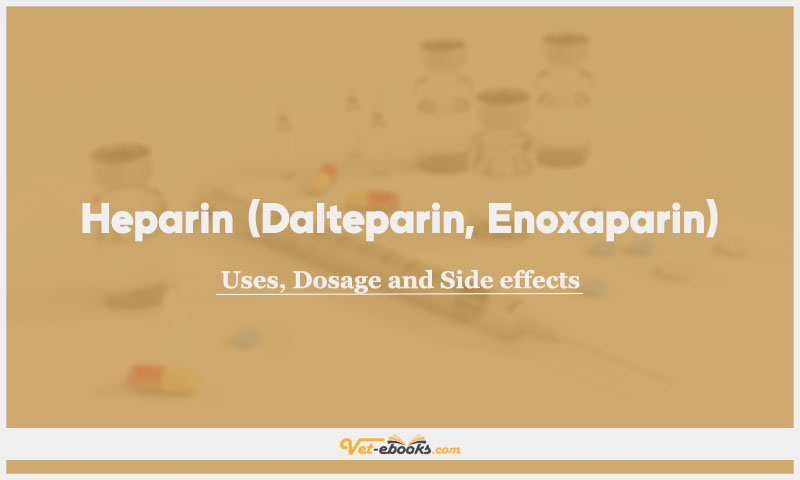Heparin (low molecular weight)
(Dalteparin, Enoxaparin): Uses, Dosage and Side Effects

Contents hide
Overview
- Anticoagulant low molecular weight heparin (LMWH) suppresses Factor Xa and thrombin.
- When compared to unfractionated heparin (UFH), LMWH has lower anti-IIa activity relative to anti-Xa activity (anti-Xa to anti-IIa ratio is 2-4:1 vs. UFH 1:1).
- At therapeutic levels, LMWH has little influence on aPTT.
- Anti-Xa activity is used to monitor LMWH therapeutically.
Uses of Heparin (low molecular weight)
(Dalteparin, Enoxaparin)
- Treatment of thromboembolic complications and hypercoagulable syndromes, such as pulmonary thromboembolism and immune-mediated hemolytic anaemia (IMHA).
- Humans are also treated with LMWH for myocardial infarction, atrial fibrillation, deep vein thrombosis, and pulmonary thromboembolism.
- Its use in DIC is controversial because controlled clinical trials on humans have failed to demonstrate any beneficial effects.
- No longer is LMWH utilised to prevent DIC.
Dose of Heparin (low molecular weight)
(Dalteparin, Enoxaparin) in Dogs and Cats
Dogs:
• 100–175 IU/kg s.c. q8h (Dalteparin).
• 0.08 mg/kg s.c. q6h (Enoxaparin).
Cats:
• 75 IU/kg s.c. q6h (Dalteparin).
• 0.75–1 mg mg/kg s.c. q6–12h (Enoxaparin).
Dogs, Cats:
- Anticoagulation: 80–150 IU/kg s.c. q4–8h.
Drug Dosage Calculator
You Should Give:
Side Effects of Heparin (low molecular weight)
(Dalteparin, Enoxaparin) in Dogs and Cats
- Protamine can be used as an antidote in the event of an overdose.
- Heparin should not be given intravenously since it can cause haematoma formation.
- Its usage in DIC may exacerbate bleeding, particularly if the patient is thrombocytopenic.
- In humans, heparin-induced thrombocytopenia syndrome is a major concern, although it has not been observed in dogs or cats.
Contraindications of Heparin (low molecular weight)
(Dalteparin, Enoxaparin) in Dogs and Cats
- Bleeding disorders or severe renal dysfunction
Some Notes:
- Use with caution when used with other medications that can cause coagulation abnormalities (e.g., aspirin, NSAIDs).
- ACTH, corticosteroids, and insulin may be inhibited by heparin.
- Heparin may raise diazepam levels in the blood.
- Heparin’s effects may be mitigated in part by antihistamines, digoxin, and tetracyclines.
- Other medications should not be mixed in the same syringe as heparin.
Tip
Do You Want To Increase Your Veterinary Knowledge and Practical Skills?
You Can Now Browse and Download +3000 Books For Veterinary Professionals & Students Online.
Download Veterinary Books














